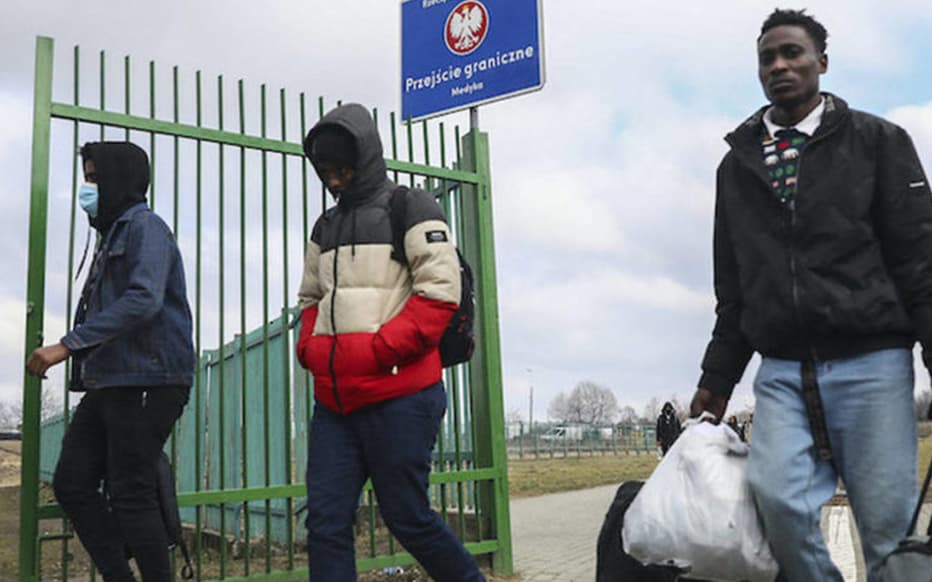Five months after the start of Russia’s offensive, precariousness and administrative insecurity are the lot of young Africans who have left the Ukraine and are trying to settle elsewhere in Europe. Our leaders must collectively come to their aid.
In February 2022, unbearable images of acts of racism against African nationals went around the world. These included young students, who were violently beaten on the borders of the Ukraine they were trying to cross, or on the outskirts of trains leaving that country: they were not considered as high a priority in their flight as others.
Today, we are witnessing another unfortunate episode. Having escaped the guns and bombardments in Ukraine – sometimes at the cost of profound trauma – to find refuge elsewhere on the Old Continent, many of them are now battling against precariousness and administrative insecurity. After granting them brief temporary protection, several European countries are now ordering African students who do not meet the conditions for obtaining a residence permit to leave their territories, on the grounds that their countries of origin are not, for the most part, at war.
Residence permits: a rare sesame
To stay in a European country on a long-term basis, these young Africans have to apply for residence permits under ordinary law. In France, for example, they have no choice but to apply for a residence permit, or to file an asylum application to avoid finding themselves in an irregular situation. However, the chances of obtaining a residence permit are slim due to the strict conditions required. The same applies to asylum applications, which are unlikely to be successful, as they will be examined on the basis of the situation in the students’ countries of origin, rather than the situation in Ukraine.
Two factual and somewhat disturbing findings emerge from these harrowing cases. The first is the double standard of European countries, far removed from the speeches made by their senior representatives at successive Africa-Europe summits, recalling the strategic importance of the relationship with Africa and the desire to commit the latter to the “camp of good”, in the crusade against the “evil Russian aggressor”. Consistency would have dictated strictly equal treatment for Africans and Ukrainians, which, by the way, would have fostered empathy among part of African public opinion. This is undoubtedly a political error that history will not ignore.
Create a group of African special envoys
The second, and more important, observation concerns the difficulty African states and institutions have in responding to the challenges facing their young people, wherever they may be. In the absence of anticipation, more robust response and coordination, hundreds of thousands of African students are left to fend for themselves when caught up in the turmoil of a crisis like the Covid-19 pandemic. Yet behind each of them lies a life project, ambitions and dreams, even the hopes of entire families, that are dangerously compromised. The recent tour by the current President of the African Union, Macky Sall, to Russia and, more recently, to the G7, on the issue of the continent’s food supply, offered an opportunity to raise the question of the abandonment of these young people and to send a strong political message in favor of these students.
Over and above condemnations of discriminatory acts and salutary initiatives by people of good will, the urgency of the moment is to respond collectively and intelligently to this challenge, in order to guarantee the conditions for a return to a normal life, educational continuity and long-term reinforcement of the continent’s ability to offer its young people training frameworks of excellence and professional success on the continent. To achieve this, a number of solutions can be explored.
First and foremost, in the short term, we need to increase access to information and rights, which are crucial to supporting these young people, who are plunged into administrative distress due to the unprecedented situation they find themselves in. This is the purpose of the platform set up by Initiative for Africa (IFA) and the Molongwi think tank, which aims to centralize all support initiatives for African students fleeing Ukraine, and to put people of good will in touch with these young people. We need to amplify and multiply this kind of tool.
Secondly, on a political level, we consider it imperative, in view of the importance of youth in the African Union’s agenda, and following the example of the continental initiatives taken during the Covid crisis, to create a body or appoint a group of special envoys from the African continent, bringing together a group of qualified personalities capable of reflecting on and responding to the economic, food and energy and, more broadly, human consequences. The eminently important issue of training and the situation of African nationals, particularly young students, should be one of the priorities of this ad hoc institution’s mandate.
Training our elites on the continent
Finally, from a medium- and long-term perspective, the question of academic excellence in Africa cannot be ignored. The current crisis poses it with singular acuity. How can we explain the perpetuation of this system of delegating the training of the continent’s future elite abroad? And how can we explain the fact that many of these young people have largely rejected the option of returning to Africa, due to the inadequacy of the continent’s training system?
The current conflict in Ukraine, like the others before it, is yet another wake-up call: the transformation of the continent requires us to build the structures and systems for our strategic autonomy in Africa. There are no shortcuts. Otherwise, we will continue to outsource our own development. It’s not too late!
The Editor (with AD and CA)



